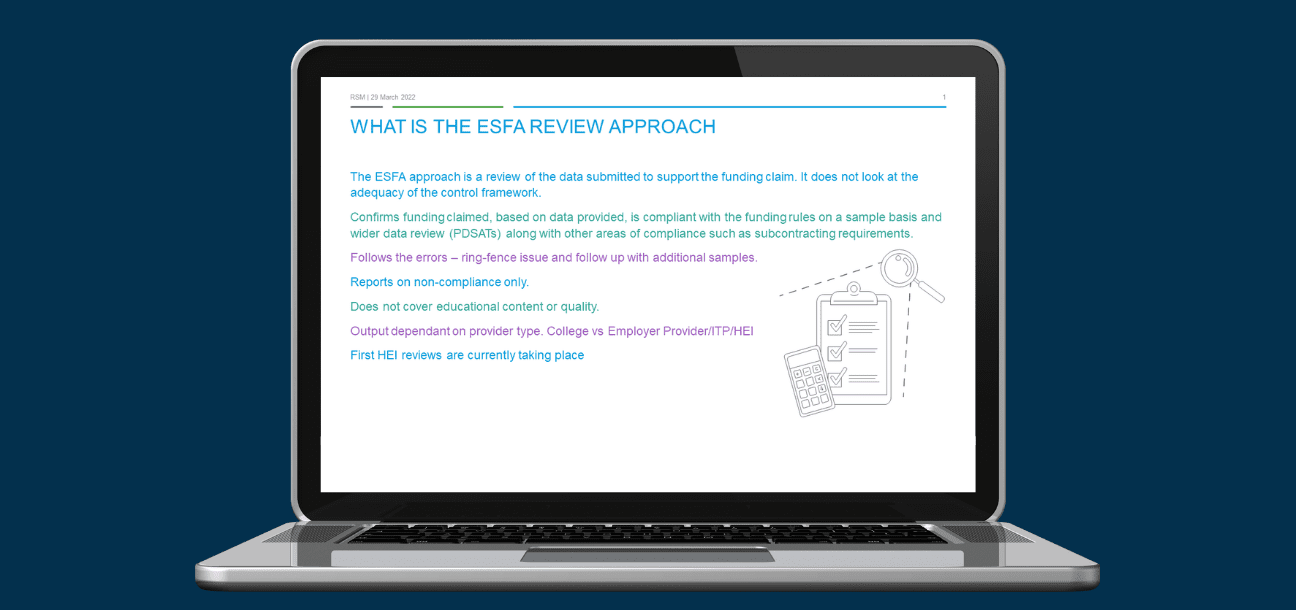Recruitment in the UK is currently extremely tough. In service industries such as Skills and Employability, the reality of struggling to find and retain talent to deliver high-quality programmes can be crippling. In this article, we take a look at how some of the leading providers are tackling this skills coach shortage, and remind ourselves of some common, yet relevant, recruitment best practices.
Continue readingGuidance FAQs for Funding Rules 22/23
Ensuring Aptem genuinely helps our customers to maintain compliance is our highest priority. To that end, we have created some guidance FAQs questions that you can consider when implementing the funding rules, effective August 22. This will help to ensure you maintain compliance.
Continue readingUnder the financial spotlight – what you can do to drive efficiencies
Companies undergoing investment or buyout from Private Equity (PE) firms and Venture Capitalists (VC) face a high level of financial scrutiny. The spotlight is on them to drive efficiencies, reduce costs and improve operating margins. For independent training companies providing fixed-cost apprenticeship programmes, this means finding other ways to improve profitability.
Continue readingSustainability and the rise of the green apprenticeship
Two million good-quality green jobs by 2030. Electricity to come from clean sources by 2035. Net zero greenhouse gas emissions by 2050. Sustainability commitments made by the UK are bold, as we all know they need to be, but what do these statistics, promises and pledges mean in practice for the skills and employability sector?
Continue readingNeurodiversity in the 21st Century and why it matters for apprenticeships
All learners have different needs. For the vocational training sector, this can mean differences in capability, homelife situation, workplace demands, learning preferences or, importantly, learning support needs. Without a base-level understanding of neurodiversity, curriculum teams, tutors and employers risk alienating a significant proportion of learners or would-be learners. In our industry, the engagement and progress of every learner matters. Embracing and supporting neurodiversity is a critical part of this.
Continue readingAttracting young people back to apprenticeships
Numbers of apprenticeship starts have dropped significantly since the start of the pandemic, most noticeably among young people under the age of 25, and for apprenticeships at levels 2 and 3. In this article we look at why this may be, the possible consequence of this drop, and the viable solutions that could help attract young people back to apprenticeships.
Continue readingAptem HE Forum recap: Special Interest webinar on ESFA funding compliance
More than 80 members of the Aptem Higher Education Forum recently benefited from a member-only Special Interest webinar on common themes that are cropping up in the HE sector on ESFA funding rule compliance. Here is a recap of the information-packed presentation and Q&A delivered by Karl Bentley, FE Funding and Data specialist at leading auditors RSM UK.
Continue readingWebinar recap: How to manage employer engagement in the delivery of apprenticeships
Tony Allen (CEO of Allen Apprenticeships and Skills), and Ben Drain (Apprenticeships Operations and Quality Director at Pareto Law) presented a webinar for more than 150 apprenticeship providers to explore the topic of effective employer engagement.
With many years of experience in apprenticeships delivery, Tony Allen and Ben Drain have deep insights into where successful providers excel in the services they provide and the growth of their organisations. In this webinar, they focused on one key component – providers’ approaches to employer engagement.
Continue readingUsing behavioural science to enhance apprenticeship delivery
“The behaviours required to prosper in a new world are different.” Aptem CEO, Richard Alberg. Although we might not yet be living in what we can call a ‘post-pandemic’ world, the pandemic has already significantly changed the behaviours and skills we need to thrive. Behavioural science can help us to pinpoint and understand these changes, as well as offer useful insights that can be applied to service delivery, and ultimately support people into work.
Continue readingThe evolution of blended learning
Blended learning incorporates in-class and remote learning, making use of digital technology to deliver engaging, flexible and collaborative education. Advances in technology have been challenging the classroom-centric mode of teaching since before the pandemic. Yet at the same time, it’s also widely recognised that technology has a significant role to play in education, not least because it is increasingly fundamental to everyday life. The role of education is to prepare young people for independence and success, and digital skills are undoubtedly essential for both.
Continue reading









